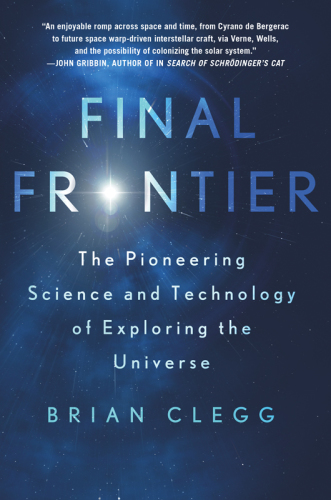
Final Frontier
The Pioneering Science and Technology of Exploring the Universe
کتاب های مرتبط
- اطلاعات
- نقد و بررسی
- دیدگاه کاربران
نقد و بررسی

May 26, 2014
British science writer Clegg (Extra Sensory) reveals the technological and social challenges we must deal with in order to launch ourselves farther into the universe. Throughout history, explorers have sought knowledge, riches, and new lands to claim, but Clegg warns that this final frontier will demand far more of us than any previous exploration. Humans will need to develop more efficient technologies for everything from getting out of Earth’s gravity well to turning space-based resources into building materials, fuel, water, and breathable air. We’ll also need to create—and sustain—long-term political and social interests in space exploration to ensure the funding that can make it a reality. Clegg offers potential ways to make exploration “pay,” including space tourism, mining, and Mars One, a reality TV show-based scheme to get humans on Mars—an idea that’s equally disturbing and tantalizing. Clegg sets his book apart from others through his thoughtful survey of fictional space exploration in books, films, and television, providing examples of adaptations and threats—both social and technological—that we’d face in space. Covering a wide range of topics from space elevators and solar sails to space arks and hardscrabble “frontier” colonies, Clegg offers readers much to think about.

April 15, 2014
Although it's a cliche, space actually does remain the last frontier, according to British science writer Clegg (Extra Sensory: The Science and Pseudoscience of Telepathy and Other Powers of the Mind, 2013, etc.) in this imaginative account of how to rekindle the thrill of the Apollo program and launch further pioneering voyages. In the United States, the exhilaration of beating Russia to the moon in 1969 evaporated quickly. The space shuttle (now retired) and the International Space Station generated only modest national attention. Clegg has a low opinion of the space station as a means of exploration, regarding it as entirely focused on the Earth. He makes an exciting case for looking beyond to the moon, planets and stars--and for doing this sooner rather than later. Transportation remains an obstacle, with rockets burning chemical propellants that are expensive, heavy and unlikely to improve greatly. However, futuristic technology should overcome this: nuclear fission and fusion rockets, solar sails, ion thrusters and mass drivers. Once in space, humans must survive for months (going to Mars) or millennia (to the stars). Clegg explains how, adding that space and other worlds will provide resources (hydrogen, water, perhaps fuel) and profits from mining. For the near future, money remains the greatest barrier to exploration. Clegg's suggestions for alternative financing--e.g., space tourism, private enterprise, a media-driven reality show--seem dubious compared with the impetus behind Apollo: beating a hated superpower rival to the punch. Readers will enjoy Clegg's lively, enthusiastic account of the technical barriers to exploring the universe, but for the first steps, they should follow the news from China, the only nation with an active manned space program. Angry at being excluded from the ISS by the U.S., China would love to deliver some kind of payback.
COPYRIGHT(2014) Kirkus Reviews, ALL RIGHTS RESERVED.

























دیدگاه کاربران